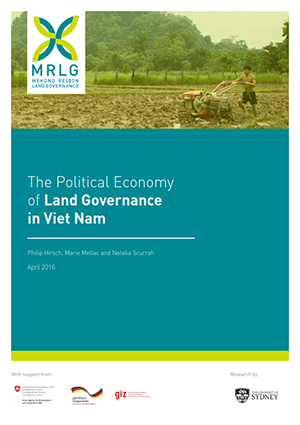Resource information
This country level analysis addresses land governance in Viet Nam in two ways. First, it summarises what the existing body of knowledge tells us about power and configurations that shape access to and exclusion from land, particularly among smallholders, the rural poor, ethnic minorities and women. Second, it draws upon existing literature and expert assessment to provide a preliminary analysis of the openings for and obstacles to land governance reform afforded by the political economic structures and dynamics in the country.
Viet Nam has been characterised by smallholder agriculture with relatively little private concentration of land; however, there is a new trend of growing inequality in access to land. Unlike Cambodia, Laos, and Myanmar, Viet Nam has seen limited development of large-scale private plantation agriculture in recent years. The loss of land by smallholders has occurred in different parts of the country in different ways and by a range of processes closely linked to the country’s rapid development toward a more industrialised, urbanised market economy. In the Mekong Delta, landlessness is associated with debt, historical patterns of landlordism, and rural to urban migration. In the Red River Delta and many other areas including medium sized urban centres, land conversion to non-agricultural uses is a significant issue. In the highlands, displacement of ethnic minorities has taken a number of forms, from migration of lowlanders to the use of land by state farms. Meanwhile, rapid coastal development, establishment of industrial estates and hydroelectric projects have displaced significant numbers of smallholders from their land.
This report on Viet Nam is one of a series of country reports on Cambodia, Laos, Myanmar and Viet Nam (CLMV) that seek to present country-level analyses of the political economy of land governance.



